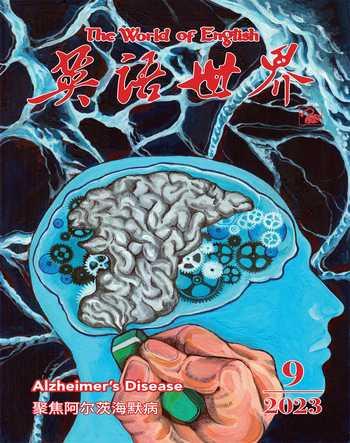The Facts About 6 Common Alzheimer’s Myths关于阿尔茨海默病常见的六种误解
杰茜卡·图默 高新媛/译
Alzheimers can be a terrifying diagnosis for families, especially when the causes of the disease and the effective ways to treat it remain a mystery to the medical community. Caregivers looking for answers are often forced to sift through tons of misinformation related to the disease to better understand it and how to care for their loved ones.
對家庭来说,有成员被诊断患上阿尔茨海默病可能是件可怕的事,特别是该病的病因和有效治疗方法仍然是医学界的未解之谜。寻求答案的护理人员常常不得不筛除与该病相关的大量错误信息,以更好地了解此病,了解如何照顾他们关爱的人。
From what causes Alzheimers to the foods that can prevent it, how genetics plays a role, and whether it can be treated, here are a few common beliefs about Alzheimers that need to be busted.
从阿尔茨海默病的成因到可以预防此病的食物、遗传学如何发挥作用,以及该病能否治愈,有些关于阿尔茨海默病的常见误解需要破除,详情如下。
Myth: Alzheimers and Dementia are two separate illnesses.
误解:阿尔茨海默病和痴呆是两种相互独立的疾病。
Fact: When we talk about degenerative illnesses like Alzheimers and dementia, theres the tendency to treat them as two separate illnesses or to use the words interchangeably. Alzheimers and dementia are part of the same family—they both affect the brain in similar ways—but theyre distinct in their differences.
事实:当人们谈论像阿尔茨海默病和痴呆这样的退行性疾病时,往往将它们当作两种独立的疾病或将这两个词互换使用。阿尔茨海默病和痴呆同源——它们都以类似的方式影响大脑——但差异明显。
Dementia is a group of symptoms, but just calling something dementia doesnt speak to the cause. There are a number of disease processes that can cause dementia. In other words, while Alzheimers is a form of dementia and therefore not a separate illness, the two terms shouldnt be swapped in for each other. Just because someone has dementia, it doesnt necessarily mean they have Alzheimers.
痴呆是一组症状,但仅仅称其为痴呆并不能解释其成因。许多疾病在发展过程中可能导致痴呆。换言之,虽然阿尔茨海默病是痴呆的一种而非不同的疾病,但这两个术语不应该互换使用。某人患有痴呆,并不一定意味着就患上了阿尔茨海默病。
Myth: Memory loss is always a sign of Alzheimers.
误解:记忆丧失就标志着患上阿尔茨海默病。
Fact: Recognizing the signs of Alzheimers can be tricky, but theres no reason that misplacing your car keys or forgetting a doctors appointment should send you into a panic. A certain amount of memory loss is a normal part of aging and most of the time, Alzheimers-related memory loss is easier to recognize.
事实:阿尔茨海默病的征兆可能难以识别,但你没理由因为把车钥匙放错地方或忘记医生预约就陷入恐慌。一定程度的记忆丧失是衰老的正常表现,而多数情况下,与阿尔茨海默病有关的记忆丧失更容易识别。
Alzheimers always includes memory loss, but memory loss isnt always the first sign. Oftentimes it is. Oftentimes, early on, people notice significant changes, especially in their short-term memory because the part of the brain that seems to be impacted first is the center of new memory and new learning.
阿爾茨海默病常常包括记忆丧失,但记忆丧失并不总是第一个出现的征兆。不过通常如此。通常在早期,人们会注意到明显的变化,尤其是短期记忆的变化,因为大脑中首先受到影响的部分似乎是新近记忆和学习的中心。
So, if youre having trouble learning new skills, remembering what day of the week or month of the year it is, then there may be a bigger issue.
因此,如果你在学习新技能时遇到困难,记不起现在是周几或哪个月份,那问题可能就比较大了。
Myth: Alzheimers only affects the elderly.
误解:阿尔茨海默病只影响老年人。
Fact: The older we get, the scarier an Alzheimers diagnosis can become. Thats because, of the 5.7 million Americans currently suffering with the illness, 5.5 million are 65 and older. But the disease doesnt just affect the elderly.
事实:年龄越大,确诊患上阿尔茨海默病可能就越可怕。这是因为,在目前患有这种疾病的570万美国人中,有550万人年龄是65岁及以上。然而,这种疾病并不仅仅影响老年人。
There are 200,000 people that we put in a category we call ‘younger onset. These people get the onset of symptoms in their 40s, 50s, and early 60s. Its rare, but it can happen.
有20万人被归为所谓“年轻发病者”。这些人在40多岁、50多岁和60岁出头就开始出现症状。这很罕见,但有可能发生。
Myth: Certain lifestyle changes can protect you from Alzheimers.
误解:生活方式的某些改变可以避免患上阿尔茨海默病。
Fact: Just like the people who believe certain factors can cause Alzheimers, there are people who think specific lifestyle changes can protect you from the disease. Theyre not completely wrong. While certain vitamins and foods like blueberries, red onions, and even marmite wont prevent an Alzheimers diagnosis, a healthy and active lifestyle can improve your chances of avoiding the disease.
事实:就像认为某些因素会导致阿尔茨海默病的那些人一样,也有人认为改变特定的生活方式可以避免患病。他们并非完全错误。虽然某些维生素和诸如蓝莓、红洋葱甚至马麦酱等食物对阿尔茨海默病没有预防作用,但健康和积极的生活方式还是可以降低患病几率。
Out of the top 10 causes of death in the United States, Alzheimers is the one that has no known prevention, cure, or even treatment that slows it down. But that said, theres more and more evidence that there are lifestyle things we can do to give our brains the best chance of healthy aging.
阿尔茨海默病位列美国十大死因,其中只有该病没有已知的预防、治愈甚或延缓病情发展的治疗手段。话虽如此,有越来越多的证据表明,我们可以通过一些良好的生活方式为大脑提供健康衰老的最佳机会。
Things like eating a balanced diet full of healthy food like fruits and veggies, being physically active, and keeping your brain healthy as well.
诸如:采取富含水果和蔬菜等健康食品的均衡饮食,积极参加体育锻炼,以及保持大脑健康。
Participating in social activities may lower the risk for some health problems and improve well-being. Being cognitively active, whether its learning a new skill, language, or musical instrument; doing the crossword or other brain puzzles; or just enjoying a favorite hobby, may also benefit your brain.
参加社会活动可以降低一些健康问题的风险并提高幸福感。积极参与认知活动,学习新的技能、语言或乐器都可以;做填字游戏或其他脑力游戏;或只是享受最喜欢的爱好,这些也对大脑有益。
Myth: Alzheimers runs in my family, so Ill have it too.
误解:阿尔茨海默病是我的家族遗传病,所以我也会得。
Fact: If a relative or immediate family member has Alzheimers, its understandable that you might be worried about your own chances for contracting the disease, but genetics arent the sole determining factor when it comes to the degenerative illness.
事实:如果有亲戚或直系亲属患有阿尔茨海默病,你可能会担心自己发病的几率,这可以理解,但涉及这种退行性疾病时,遗传并不是唯一的决定因素。
Genetics for most of us are risk factors. So, think of it like heart disease. If you have family members with heart disease or certain types of cancers, your doctor may tell you that you have a higher risk for those things. It doesnt mean youre going to get them, but its something to look out for a little bit more. So those of us who have direct family members with Alzheimers disease do have a greater risk factor, but it doesnt mean were going to get Alzheimers.
对我们大多数人来说,遗传是风险因素。因此,不妨把它假想成心脏病。如果有家人患有心脏病或某些类型的癌症,你的医生可能会告诉你,你罹患这些疾病的风险更高。这并不意味着你肯定会患病,但确实需要多加注意。所以,直系亲属患有阿尔茨海默病的那些人确实患病风险更大,但这并不意味着就会得上阿尔茨海默病。
Myth: Alzheimers can be treated and eventually cured.
误解:阿尔茨海默病可以治疗并最终治愈。
Fact: Unfortunately, while there are drugs that help alleviate symptoms associated with Alzheimers, we havent found a cure to the disease, or even a way of slowing it down, yet.
事实:不幸的是,虽然有药物可以帮助缓解与阿尔茨海默病相关的症状,但我们还没有找到治愈这种疾病的方法,连延缓病情发展的方法都没有找到。
There are no drugs currently that can slow down the pathology, the damage thats happening in the brain, but there are drugs that can help the brain have access to chemicals that make making connections easier. These medications help people with their quality of life, but they dont stop the disease progression. They dont cure anything.
目前沒有任何药物可以减缓病理变化——即大脑正遭受的损害——但有一些药物可以帮助大脑获得让建立连接更容易的化学物质。这些药物可帮助人们提高生活质量,但并不能阻止疾病的恶化。它们解决不了什么问题。
(译者为“《英语世界》杯”翻译大赛获奖者)
- 英语世界的其它文章
- What Is Alzheimer’s Disease?何为阿尔茨海默病?
- 7 Ways to Reduce Your Alzheimer’s Risk降低阿尔茨海默病患病风险的七因素
- Interacting with People with Alzheimer’s与阿尔茨海默病患者的相处之道
- When an Alzheimer’s Patient Says They Want to Go Home…当阿尔茨海默病患者说想回家时……
- 7 Films That Show the Truth About Living with Alzheimer’s揭示阿尔茨海默病患者真实生活的七佳片
- ChatGPT’s AI Can Help Screen for Alzheimer’sChatGPT的人工智能可帮助筛查阿尔茨海默病

